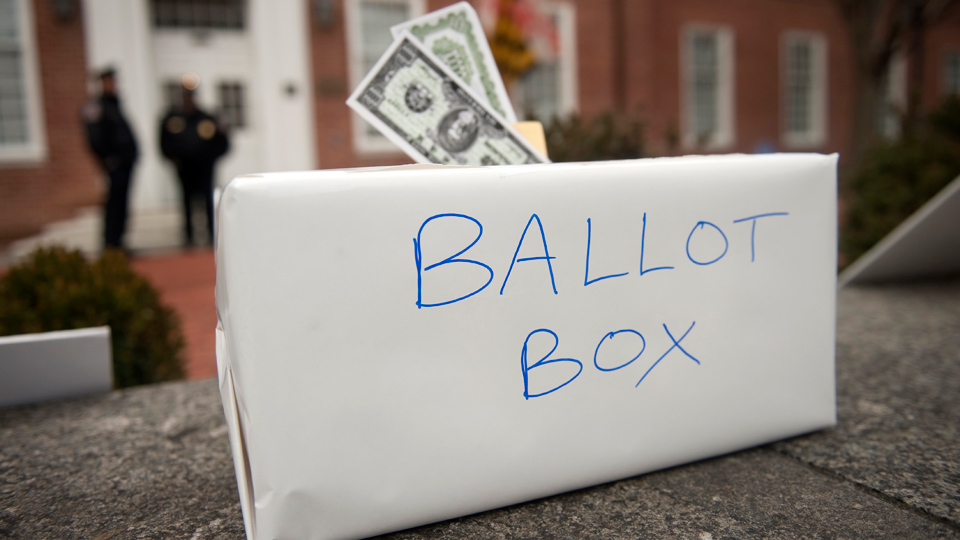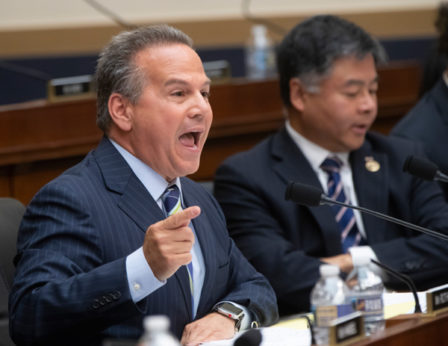
WASHINGTON—In what has become a common ritual, the House’s ruling Republicans once again shot down a Democratic attempt to shine a bright light on shady campaign finances nationwide.
The issue is important to workers and their allies: The “dark money”—carloads of corporate and CEO cash—buy politicians on both sides of the aisle through campaign contributions and spending hundreds of millions of dollars without identifying who put up the money, much less what they expect in return.
As part of a 2017 AFL-CIO convention resolution outlining how the fed would take on Wall Street, it pledged to “fight to expose corporate political spending and lobbying that undermines our democracy.”

But the House Republican majority didn’t listen to workers—or voters—upset with the tsunami of corporate campaign cash. On July 11, lawmakers voted 225-186 to close debate on a fisheries bill, rather than opening it to amendments. Rep. David Cicilline, D-R.I., argued for opening it to amendments so he could offer the Disclose Act, a measure to force sources of such “dark money” into the open.
All but one Republican—Walter Jones of North Carolina, a frequent renegade—voted to close up the bill, and thus ban the amendment. Jones and all 185 Democrats voted to let the Disclose Act come up.
Eight years ago, the GOP-named 5-man majority on the U.S. Supreme Court threw wide open the money doors to corporate and special interest influence in election campaigns, in its Citizens United ruling. The majority followed up with a decision—in a case brought by a rich GOP donor, with party aid and support—to take the shackles off individual contributions, too.
Those two rulings “opened the floodgates to massive spending by corporations and even more so by wealthy donors,” the fed said around the time of the court’s second edict.
“They are pouring money into our electoral system and threaten to drown out the voices of hard-working Americans. Common-sense restrictions on their spending are needed, along with robust disclosure of their contributions and expenditures—including their contributions to organizations engaged in electoral activity.”
Ever since then, congressional Democrats have railed against the High Court’s ruling, but their efforts to counteract it, even by the simply forcing disclosure of sources of the spigots of corporate cash deciding U.S. elections, have gone nowhere.
Democrats tried to get it through Congress in 2010, 2012, 2014, 2015, and 2017. After Citizens United in early 2010, the then-Democratic-run House passed the Disclose Act in mid-2010, 219-206, though 36 Dems voted “no,” while two Republicans voted “yes.” It went nowhere in the Senate that year, though.
Their latest attempt went nowhere again. That’s important, Cicilline said.
“Each day, more and more Americans are losing faith that their government actually works for them. More than 80 percent of Americans say they can’t trust Washington to do what’s right for them. More than two-thirds feel like our democracy is getting less responsive under Republican control. Working people today don’t even get a seat at the table,” he said.
“The Republicans who control Congress have given away all the seats at their table to corporate special interests, to billionaires, and to the big banks and big pharmaceutical companies. That’s why the interests of working people are not being protected today.
“They know they are caught in a system rigged against them. Their voices are dismissed. Their concerns are ignored.” So Cicilline tried to put his colleagues on the record. He failed.
Rep. Jared Polis, D-Colo., joined the debate on Cicilline’s side. “This bill would require organizations spending money on federal elections to disclose their donors and guard against hidden foreign interference in our democracy,” he said.
The only GOP response came from Rep. Bradley Byrne, R-Ala., known for his anti-worker stands. He snidely suggested if the Democrats are sincere, they unilaterally refuse corporate campaign cash.
“I’m nowhere near done fighting for transparency in our elections,” Cicilline said afterwards. “I will continue working to advance commonsense ethics and campaign finance reforms that end the rule of big money and begin a new era where working people get all the seats at the table.”
Like free stuff? So do we. Here at People’s World, we believe strongly in the mission of keeping the labor and democratic movements informed so they are prepared for the struggle. But we need your help. While our content is free for readers (something we are proud of) it takes money — a lot of it — to produce and cover the stories you see in our pages. Only you, our readers and supporters, can keep us going. Only you can make sure we keep the news that matters free of paywalls and advertisements. If you enjoy reading People’s World and the stories we bring you, support our work by becoming a $5 monthly sustainer today.

MOST POPULAR TODAY

High Court essentially bans demonstrations, freedom of assembly in Deep South

Zionist organizations leading campaign to stop ceasefire resolutions in D.C. area

UN warns that Israel is still blocking humanitarian aid to Gaza

U.S. imperialism’s ‘ironclad’ support for Israel increases fascist danger at home







Comments